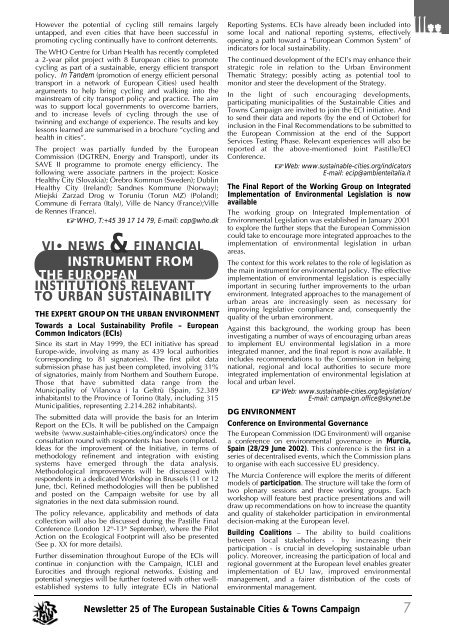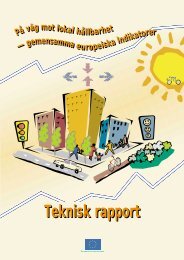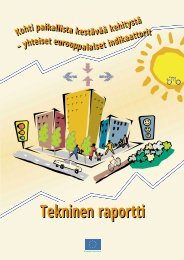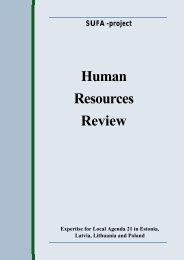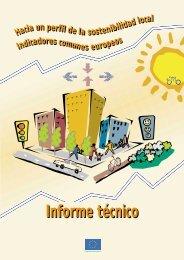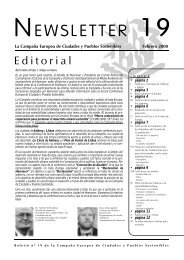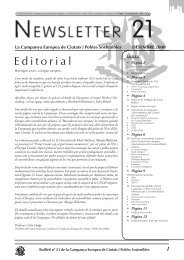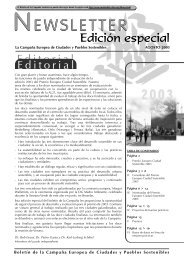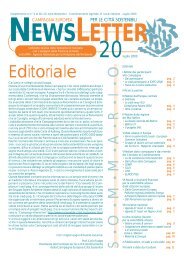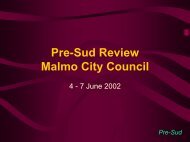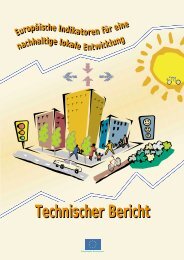the european sustainable cities and towns campaign
the european sustainable cities and towns campaign
the european sustainable cities and towns campaign
Create successful ePaper yourself
Turn your PDF publications into a flip-book with our unique Google optimized e-Paper software.
However <strong>the</strong> potential of cycling still remains largely<br />
untapped, <strong>and</strong> even <strong>cities</strong> that have been successful in<br />
promoting cycling continually have to confront deterrents.<br />
The WHO Centre for Urban Health has recently completed<br />
a 2-year pilot project with 8 European <strong>cities</strong> to promote<br />
cycling as part of a <strong>sustainable</strong>, energy efficient transport<br />
policy. In T<strong>and</strong>em (promotion of energy efficient personal<br />
transport in a network of European Cities) used health<br />
arguments to help bring cycling <strong>and</strong> walking into <strong>the</strong><br />
mainstream of city transport policy <strong>and</strong> practice. The aim<br />
was to support local governments to overcome barriers,<br />
<strong>and</strong> to increase levels of cycling through <strong>the</strong> use of<br />
twinning <strong>and</strong> exchange of experience. The results <strong>and</strong> key<br />
lessons learned are summarised in a brochure “cycling <strong>and</strong><br />
health in <strong>cities</strong>”.<br />
The project was partially funded by <strong>the</strong> European<br />
Commission (DGTREN, Energy <strong>and</strong> Transport), under its<br />
SAVE II programme to promote energy efficiency. The<br />
following were associate partners in <strong>the</strong> project: Kosice<br />
Healthy City (Slovakia); Örebro Kommun (Sweden); Dublin<br />
Healthy City (Irel<strong>and</strong>); S<strong>and</strong>nes Kommune (Norway);<br />
Miejski Zarzad Drog w Toruniu (Torun MZ) (Pol<strong>and</strong>);<br />
Commune di Ferrara (Italy), Ville de Nancy (France);Ville<br />
de Rennes (France).<br />
pWHO, T:+45 39 17 14 79, E-mail: cop@who.dk<br />
& VI• NEWS F I N A N C I A L<br />
INSTRUMENT FROM<br />
THE EUROPEAN<br />
INSTITUTIONS RELEVANT<br />
TO URBAN SUSTAINABILITY<br />
THE EXPERT GROUP ON THE URBAN ENVIRONMENT<br />
Towards a Local Sustainability Profile – European<br />
Common Indicators (ECIs)<br />
Since its start in May 1999, <strong>the</strong> ECI initiative has spread<br />
Europe-wide, involving as many as 439 local authorities<br />
(corresponding to 81 signatories). The first pilot data<br />
submission phase has just been completed, involving 31%<br />
of signatories, mainly from Nor<strong>the</strong>rn <strong>and</strong> Sou<strong>the</strong>rn Europe.<br />
Those that have submitted data range from <strong>the</strong><br />
Municipality of Vilanova i la Geltrù (Spain, 52.389<br />
inhabitants) to <strong>the</strong> Province of Torino (Italy, including 315<br />
Municipalities, representing 2.214.282 inhabitants).<br />
The submitted data will provide <strong>the</strong> basis for an Interim<br />
Report on <strong>the</strong> ECIs. It will be published on <strong>the</strong> Campaign<br />
website (www.sustainhable-<strong>cities</strong>.org/indicators) once <strong>the</strong><br />
consultation round with respondents has been completed.<br />
Ideas for <strong>the</strong> improvement of <strong>the</strong> Initiative, in terms of<br />
methodology refinement <strong>and</strong> integration with existing<br />
systems have emerged through <strong>the</strong> data analysis.<br />
Methodological improvements will be discussed with<br />
respondents in a dedicated Workshop in Brussels (11 or 12<br />
June, tbc). Refined methodologies will <strong>the</strong>n be published<br />
<strong>and</strong> posted on <strong>the</strong> Campaign website for use by all<br />
signatories in <strong>the</strong> next data submission round.<br />
The policy relevance, applicability <strong>and</strong> methods of data<br />
collection will also be discussed during <strong>the</strong> Pastille Final<br />
Conference (London 12 th -13 th September), where <strong>the</strong> Pilot<br />
Action on <strong>the</strong> Ecological Footprint will also be presented<br />
(See p. XX for more details).<br />
Fur<strong>the</strong>r dissemination throughout Europe of <strong>the</strong> ECIs will<br />
continue in conjunction with <strong>the</strong> Campaign, ICLEI <strong>and</strong><br />
Euro<strong>cities</strong> <strong>and</strong> through regional networks. Existing <strong>and</strong><br />
potential synergies will be fur<strong>the</strong>r fostered with o<strong>the</strong>r wellestablished<br />
systems to fully integrate ECIs in National<br />
bbbnn<br />
Reporting Systems. ECIs have already been included into<br />
some local <strong>and</strong> national reporting systems, effectively<br />
opening a path toward a “European Common System” of<br />
indicators for local sustainability.<br />
The continued development of <strong>the</strong> ECI’s may enhance <strong>the</strong>ir<br />
strategic role in relation to <strong>the</strong> Urban Environment<br />
Thematic Strategy; possibly acting as potential tool to<br />
monitor <strong>and</strong> steer <strong>the</strong> development of <strong>the</strong> Strategy.<br />
In <strong>the</strong> light of such encouraging developments,<br />
participating municipalities of <strong>the</strong> Sustainable Cities <strong>and</strong><br />
Towns Campaign are invited to join <strong>the</strong> ECI initiative. And<br />
to send <strong>the</strong>ir data <strong>and</strong> reports (by <strong>the</strong> end of October) for<br />
inclusion in <strong>the</strong> Final Recommendations to be submitted to<br />
<strong>the</strong> European Commission at <strong>the</strong> end of <strong>the</strong> Support<br />
Services Testing Phase. Relevant experiences will also be<br />
reported at <strong>the</strong> above-mentioned Joint Pastille/ECI<br />
Conference.<br />
pWeb: www.<strong>sustainable</strong>-<strong>cities</strong>.org/indicators<br />
E-mail: ecip@ambienteitalia.it<br />
The Final Report of <strong>the</strong> Working Group on Integrated<br />
Implementation of Environmental Legislation is now<br />
available<br />
The working group on Integrated Implementation of<br />
Environmental Legislation was established in January 2001<br />
to explore <strong>the</strong> fur<strong>the</strong>r steps that <strong>the</strong> European Commission<br />
could take to encourage more integrated approaches to <strong>the</strong><br />
implementation of environmental legislation in urban<br />
areas.<br />
The context for this work relates to <strong>the</strong> role of legislation as<br />
<strong>the</strong> main instrument for environmental policy. The effective<br />
implementation of environmental legislation is especially<br />
important in securing fur<strong>the</strong>r improvements to <strong>the</strong> urban<br />
environment. Integrated approaches to <strong>the</strong> management of<br />
urban areas are increasingly seen as necessary for<br />
improving legislative compliance <strong>and</strong>, consequently <strong>the</strong><br />
quality of <strong>the</strong> urban environment.<br />
Against this background, <strong>the</strong> working group has been<br />
investigating a number of ways of encouraging urban areas<br />
to implement EU environmental legislation in a more<br />
integrated manner, <strong>and</strong> <strong>the</strong> final report is now available. It<br />
includes recommendations to <strong>the</strong> Commission in helping<br />
national, regional <strong>and</strong> local authorities to secure more<br />
integrated implementation of environmental legislation at<br />
local <strong>and</strong> urban level.<br />
pWeb: www.<strong>sustainable</strong>-<strong>cities</strong>.org/legislation/<br />
E-mail: <strong>campaign</strong>.office@skynet.be<br />
DG ENVIRONMENT<br />
Conference on Environmental Governance<br />
The European Commission (DG Environment) will organise<br />
a conference on environmental governance in Murcia,<br />
Spain (28/29 June 2002). This conference is <strong>the</strong> first in a<br />
series of decentralised events, which <strong>the</strong> Commission plans<br />
to organise with each successive EU presidency.<br />
The Murcia Conference will explore <strong>the</strong> merits of different<br />
models of participation. The structure will take <strong>the</strong> form of<br />
two plenary sessions <strong>and</strong> three working groups. Each<br />
workshop will feature best practice presentations <strong>and</strong> will<br />
draw up recommendations on how to increase <strong>the</strong> quantity<br />
<strong>and</strong> quality of stakeholder participation in environmental<br />
decision-making at <strong>the</strong> European level.<br />
Building Coalitions – The ability to build coalitions<br />
between local stakeholders - by increasing <strong>the</strong>ir<br />
participation - is crucial in developing <strong>sustainable</strong> urban<br />
policy. Moreover, increasing <strong>the</strong> participation of local <strong>and</strong><br />
regional government at <strong>the</strong> European level enables greater<br />
implementation of EU law, improved environmental<br />
management, <strong>and</strong> a fairer distribution of <strong>the</strong> costs of<br />
environmental management.<br />
Newsletter 25 of The European Sustainable Cities & Towns Campaign<br />
7


